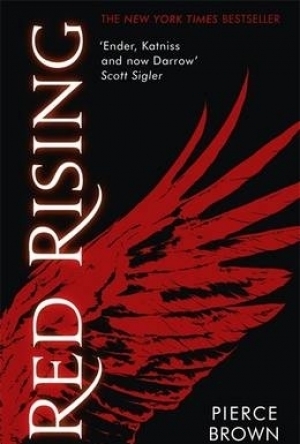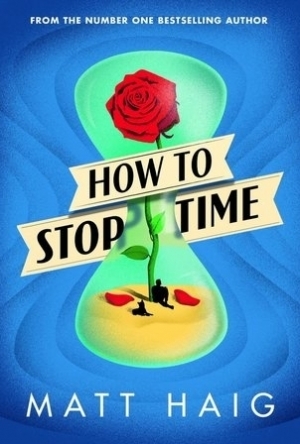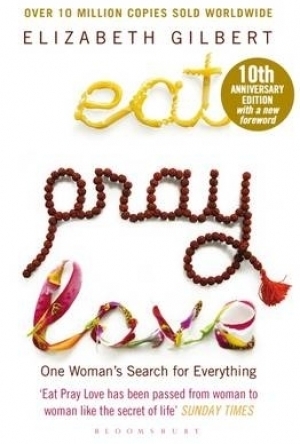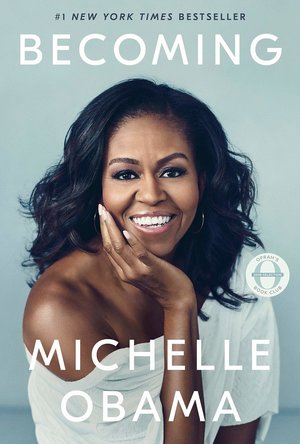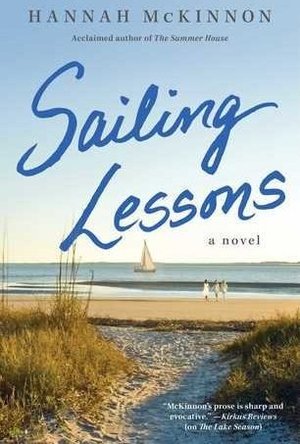Hazel (1853 KP) rated Red Rising in Books
May 30, 2017
Red Rising by debut author Pierce Brown is a very difficult book to review. It is clear that Brown is an excellent writer with amazing ideas, but at the same time it does not feel possible to rate the book any higher that two or three stars. This first book of three is somewhat alike The Hunger Games Trilogy by Suzanne Collins and has some very exciting themes. However at other times it provoked a range of emotions from disgust to almost verging on boredom.
Set thousands of years in the future, the world has become colour coded. Gold are the elite, the ruling colour, and at the bottom of the pile are the Reds. Darrow is a Red and lives below the surface of the planet Mars in the mines with the responsibility of helping to make the planet’s surface habitable for humans in the future. He soon discovers that the ruling societies have been lying to him all his life, and to the many generations before him. But there is an uprising brewing and Darrow has been chosen to play a vital role in it, even though that means pretending to be the enemy.
Although it was difficult to get into the novel it appeared to be clear what the plot would be about. Wrong! Once Darrow has been trained to behave like a Gold the storyline changes completely. It is almost as though it is a different book altogether. Red Rising suddenly becomes Hunger Games-esque and the situations with the Reds, while being referred to once or twice, was all but forgotten. Presumably those original themes will continue within the final books of the trilogy.
Living under the surface of Mars with no sunlight speeds up the aging process of the inhabitants. People in the thirties are considered old; therefore even though Darrow is a teenager in Earth years, he is portrayed as a man – an image that is difficult to shake off throughout the entire book. Once Darrow is living with the Golds and, supposedly, resembling his true age, it is still easy to forget that he is young. This may change the way the reader pictures the scenes compared with how the author intended them to be imagined. The characters are still only children but may be mistaken for adults due Darrow’s opening scenes.
It cannot be denied that Brown is a very knowledgeable writer. As well as writing in an exceptionally well-structured way, he incorporates a vast amount of high culture into his story. A lot of the novel is influenced by Greek and Roman mythology and he also quotes famous philosophers such as Cicero and Plato. So despite its science fiction genre it also has a slight educational nature.
Something interesting about Red Rising was the character development of Darrow. At the beginning he was rather naïve, believing everything he was told, following orders etc. But soon he becomes more confident, clever, Gold-like. However he then becomes like a wild beast, killing to survive, to win. Thankfully his cleverness takes control and he realises that he needs to become a leader and not a tyrant. Towards the end he even becomes messiah-like. As Darrow progresses through these changes he becomes a more likable character.
I am not sure whether I want to read the next installment of Red Rising. For the beginning storyline to continue and become the main focus, the book would need to be completely different. This could be a good thing because, as mentioned, there were times when it was a little boring, however there’s the risk that it will not feel like a follow on from the first book. I do not want to put anyone off from reading it, but I will honestly say that it was not really what I was expecting.
Hazel (1853 KP) rated How to Stop Time in Books
Jun 30, 2017
All the world’s a stage/And all the men and women merely players/They have their exits and their entrances/And one man in his time plays many parts …
How to Stop Time is British author Matt Haig’s latest novel, and a very interesting one it is, too. In the present day, Tom Hazard is a 40-something-looking man who has landed himself with the position of history teacher at a comprehensive school in Tower Hamlets. Despite not having any formal training, Tom is the perfect candidate for the position because, despite his looks, he is 439 years old. But, that is a secret that no one must ever discover.
The book jumps back and forth between the current time period and flashbacks to various events during Tom’s extensive past. Born in 1581, Tom has experienced a great part of British history and major events around the world. Constantly changing his name and identification, he moved around the world, switching locations whenever people began to get suspicious of his never-aging body.
After a couple of centuries, Tom met a man with the same condition as himself, who revealed that there were many people in the same predicament. Promising to be able to help keep him safe, the stranger coerces Tom into a union called the Albatross Society. There are many rules and conditions to follow, however, the most important advice is to never fall in love. Unfortunately, Tom has already done this.
In London 1623, Tom met the love of his life, Rose, who he eventually married and with whom he had a daughter. Although Tom does age, it is at the rate of one year every 15; therefore he eventually had to leave his family in order to keep them safe. However, his daughter Marion has inherited his condition and Tom spends his subsequent years trying to find her. With promises to help him on his quest, Tom reluctantly joins the Albatross Society, despite their questionable ways.
All Tom wants is to be able to lead a normal life, yet the narrative reveals how impossible this has been, both in the past and now in the present. From Elizabethan England to Elizabeth II’s reign, Tom lives through several monarchs, wars, colloquial changes, industrialisation, sanitisation of comestibles, and the introduction of digital technology. Without the added pressure of keeping his true identity disguised, it is very interesting to experience historical events through the eyes of the protagonist.
The ending, unfortunately, does not quite satisfy the growing excitement and interest of the rest of the novel. Important things happen too quickly, making it confusing to understand the main storyline. The majority of the story appears to only be setting the scene for the final couple of chapters, but as this is so fascinating, there cannot be too much complaint.
Presuming that Haig has done his research and that the historical periods are factually correct, How to Stop Time is as educational as it is entertaining. History lovers will enjoy reading about famous people such as Shakespeare and Charlie Chaplin, as well as getting an insight into the daily lives of past societies. Most importantly, Tom is a captivating character, who, despite having lived for four centuries, is still as socially awkward as the best of us.
How to Stop Time contains a fantastic concept about the progression of time and aging, but its most poignant point is the emphasis on finding and being you. Change is an inevitable certainty, as witnessed by Tom whose current world looks nothing like his memories. Although people must adapt to the on-going changes, living how you want is more important than adjusting to fit in with everyone else. In essence, do not be afraid to let the world see your true self.
Rachel King (13 KP) rated Eat Pray Love: One Woman's Search for Everything in Books
Feb 11, 2019
As for her trip to Italy, I loved every page of it. I felt like I was living it through her words and experiences, wishing I was there with her to taste the food and learn the language. Italy has always been a dream of mine, though I intend to visit the sites, too, not just experience the food and language. I found the scene in which she is fasinated by the Italian man cursing at the soccer game to be a great example of her love for Italy and something I would probably do myself. I was only disappointed that this section was not longer and she did not go into greater detail about everything that she ate. I will certainly have to remember to try the pizza in Naples.
I found her trip to India the most difficult to get through, especially when I reached the point in which she decides to not do any traveling around India - a major disappointment for me. Richard from Texas was the highlight of this section for me, since he seemed to be the most down-to-earth of all the interesting people she meets here, and offers her the soundest advice. The focus of this section was on spirituality, but as it is heavily influenced by Eastern religions, I found myself disagreeing with many of her personal beliefs, even though I admired her dedication and determination. Her views of "kundalini shakti" are a perfect example - Christianity teaches that this is a demonic / occult practice, but Gilbert believes that it is the same thing as the Holy Spirit. This section alone is proof enough for me as to why I stay away from philosophical books.
Her final trip to Bali, Indonesia was educational in many ways, as I knew nothing about the culture and history there. Her medicine man, Ketut Liyer, was quite an interesting character, and I really felt for the young man she befriended, Yudhi, who was forced unfairly to leave the United States thanks to the Homeland Security Act. I find it interesting that she failed in completing her year of celibacy, but I'm sure those Brazilian men can be quite tempting when they want to be. Those who say that Gilbert appears very selfish in this book seem to ignore that she helped a divorced woman - an unheard-of thing in Bali - with three children, obtained a piece of land for her own home and business before Gilbert had to leave the country.
Overall, this year in the life of Elizabeth Gilbert was certainly a memorable one, and one that many, many other women would happily take her place in. I don't find her any more selfish than anyone else who is trying to find a way out of grief and depression, as well as break destructive cycles in his or her life. She was just blessed enough to be payed for the effort to document the experience.
"Your story is what you have, what you will always have. It is something to own."
I almost do not want to review this book, because I feel like I cannot do justice to the woman that is Michelle Obama. This is a really beautiful book, and it's also really informative. I learned so much about Mrs. Obama and her life, which I very much enjoyed.
First of all, she's a great storyteller. This is a big book, and it's a bit of an undertaking, but it's an easy read, and a really interesting one. I found myself completely immersed--I really loved learning about her childhood and her family. And, of course, it's fun to hear about how she met Barack (his marriage proposal is pretty amazing). Learning about both of their origins is fascinating, honestly. I mean, I knew that the Obamas weren't from the old-school political establishment, but it wasn't until I was reading about her life--and hearing more about the former President's--that it really hit home to me. It's amazing how much they have accomplished for our country.
Ms. Obama does a wonderful job of weaving her themes throughout her story--the power of education, of having an advocate, the importance of diversity and women's rights, and how vital children are in her life. She is honest about the realities of working motherhood: both for her life and for those of working Americans. It's also great to get little asides about her daughters (e.g., families at their schools sending in cupcakes for the Secret Service agents on birthdays); funny stories about meeting the Queen; and her mom sounds like a real trip.
"Kids made me feel like myself again. To them, I wasn't a spectacle. I was just a nice, kinda-tall lady."
She also talks about serious matters: race, education, and her reluctance about getting her family into politics. We see how importance her daughters are to her and how hard it was, knowing what they were sacrificing when her husband ran for President. We hear about her struggles being the first African American First Lady--the stings she felt from the racial insults aimed at both her and her husband, the fear she felt for her family's safety, and the attempts she made to find her place in Washington. I found myself copying quotes right and left, because she is so intelligent and profound and because, truly, as we all learned over eight years, she's such a relatable person.
"Kids wake up each day believing in the goodness of things, in the magic of what be. They're uncynical, believers at their core. We owe it to them to stay strong and keep working to create a more fair and humane world. For them, we need to remain both tough and hopeful, to acknowledge that there's more growing to be done."
Overall, this was a great memoir. It was informative, educational, and also inspiring and funny. It made me miss the Obama family all over again and appreciate so much their time in the Oval Office. It also gave me even more insight into Mrs. Obama, her life, and her feelings. I highly recommend it.
Kristy H (1252 KP) rated Sailing Lessons in Books
Mar 18, 2019
I really enjoyed this book, and I found myself quite enraptured by its characters. I'm a sucker for some island-themed fiction (I'd love to go to the Cape or Nantucket someday, though I'll be so sad when everyone there isn't grappling with family issues and/or falling in love at first sight!). This was one of the books that I read at the right time, as I needed a story I could escape into. I started it while I was on "vacation" (a trip to Great Wolf Lodge with six-year-old twins - you determine if this counts as a vacation), and I found myself wishing I could transport myself to a beach somewhere to finish it.
The characters in this tale are simply interesting and fascinating. I don't know how else to say it, except I liked them, you know? OK, it took a little while to warm up to Shannon, but I could definitely relate to bits of her anxious characteristics. But I especially loved Wren and Hank. I could just picture them so easily, and I was rooting for them the entire way. (I sort of want Hank to be my Dad now.) Even Caleb was an intriguing sort of guy in his own way.
"He'd been given a talent for capturing images and a woman whom he'd loved with a fierceness that he could never seem to capture. And he'd lost it all."
So, yes, there's a bit of predictability to this one, but there's a comfortableness to it that I really liked (and needed). And there were definitely some pieces I didn't always see coming, too. Plus, I was so caught up in the characters that I was along for the ride, no matter what. They were well-written, and I was invested in their lives, which is a sign of good women's fiction, in my opinion. I had a bit of a dysfunctional childhood myself, so maybe I could relate well to this one; it just worked well for me.
"'Memory has weight. We carry it around with us in our baskets.' It had sounded lovely to her ears as a kid, this bountiful collection: a bushel of fruit, a bouquet of flowers. But as she grew, it took on a new meaning. There were days Shannon wished to set her basket of memories down; days she wished to abandon it altogether."
Overall, I really enjoyed this book. Interesting characters, easy-moving plot--it was just a good read. I was actually a little sad to say goodbye to the sisters and their clan by the end.
Hazel (1853 KP) rated Notes on Blindness: A Journey Through The Dark in Books
Dec 17, 2018
It is not often a blind man writes a book, and “write” is a word used due to the lack of a better. John M. Hull gradually lost his sight, registering as blind in 1980, a couple of days before the birth of his son. Although anticipating the event, John struggled to come to terms with his new circumstances and adjust to a new way of living. From 1983 through to 1985, John recorded his thoughts on tape, in diary form, as a way to ascertain and understand his predicament. Originally titled <I>Touching the Rock</I> (1990), John’s book has been republished as <I>Notes on Blindness</i> after the release of the film of the same name.
Initially, John made recordings every day, dictating the everyday occurrences he encountered. Amazingly, despite his disability, John was able to continue as a university lecturer and delve deeper into the world of theology. The way John thinks things through as he speaks reflects his academic abilities. Although he may have despaired at the thoughts of not being able to see his children, he had a fairly positive outlook on life.
John’s thought capacity and religious ideology are evident in his assemblage of diary entries. As a blind person, he learns to see the world in an alternative way, and often feels closer to God as a result. Through these new experiences, John begins to see the light despite the darkness.
The metaphorical descriptions of blindness help the reader to understand the horror and difficulties not being able to see visually provokes. This is heightened by John’s recordings of the bad dreams he often suffers, in which he is able to see. His fixations on these dreams are assumedly a fascination with visual imagery, which he does not have access to in his waking life.
It is hard not feel sorry for John as he reports the conversations he has with his young children. The effort to communicate and play with them is far greater than a seeing parent. Remarkably, as John begins to adjust to his new lifestyle, his children take the situation in their stride.
<i>Notes on Blindness</i> is also an educational narrative for those without sight problems. John explains the things other people, in attempts to be helpful, do that result in making things far more confusing for John as he tries to navigate his way from one place to another. Despite what most think, blind people are fairly good at walking routes they are familiar with, and, with the help of a stick, can safely travel through new areas. Once people start shouting instructions, it is difficult to pay attention to the location and listen to everyone else at the same time.
John’s voice is extremely articulate, and his thoughts profound, which may suggest heavy editing when compiling the recordings into written form. However, as he is an academician, his eloquence of speech does not feel forced or faked.
<i>Notes on Blindness</i> remains the same as the original publication but with the added inclusion of an introduction by Cathy Rentzenbrink, and an epilogue by his wife Marilyn, written in 2016, a year after his death. These, the latter in particular, provide an insight into how John’s blindness affected those around him and emphasises what a truly remarkable man he was.
Of the many memoirs available on bookshelves today,<i> Notes on Blindness</i> is a truly unique publication. It is not telling a story, or recounting a well-lived life, but gives great insight into the world of the blind. As John’s thoughts were not originally recorded with intention of being available to everyone, they are all the more personal and honest, provoking emotion and providing the reader with a new way of seeing. It is a book that will stay with you for a very long time.

Monster Math For Kids - Games
Education and Games
App
Monster Math helps your child practice and learn over 67 math skills within basic geometry,...

FarFaria Stories To Read Along
Education and Book
App
- “Brain Expander” –Parenting Magazine - “Netflix for Children's Books!” –USA Today -...
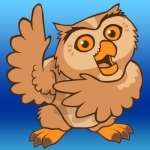
Proloquo2Go
Education and Medical
App
Proloquo2Go is an award-winning symbol-supported communication app. It provides a voice to over...

SING to READ
Education and Music
App
“Educational, great fun and simply the best way to help adults and children understand the choices...
